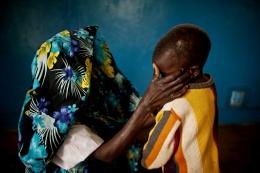
Editor's Note: This blog post was originally published by the The Daily Beast on the "Women of the World" vertical.
Half a million women were raped during the Rwandan genocide. As many as 64,000 suffered sexual violence during Sierra Leone's brutal blood diamond fueled civil war. And 40,000 were raped in Bosnia. The sheer magnitude of women raped and the frequency of the crime tells us something. These attackers aim to do more than rape. They seek to shame and demoralize, break down the fabric of victim communities, and stigmatize survivors for life.
With the vocal support of Nicole Kidman, Angelina Jolie and Charlize Theron, the United Nations has partnered with the UK to launch a powerful new political campaign to end rape in war. Already, 128 countries have publicly committed themselves to a new Declaration of Commitment to End Sexual Violence in Conflict, which Jolie has described as the "clearest statement we have heard, ever, that the international community must and will confront these crimes." More countries are joining every day.
One of the most remarkable elements of this new initiative is its thoughtful intervention into the world of peacemaking. Among the dozen specific and pragmatic pledges enshrined in the declaration, the signatories promise to promote women’s full participation in peace negotiations. In doing so, the declaration casts women as more than victims of sexual assault during conflict who require restitution. Instead, it envisions them as peacemakers and change agents for their countries' futures.
Engendering peace is always difficult, but doing so without a gender-balanced team at the table is almost impossible. In the Enough Project’s work in Sudan, South Sudan, Uganda and the Democratic Republic of the Congo, bringing women into the peace process has been a constant struggle. Philister Baya Lawiri, a women's rights activist who now serves as the chair of independent South Sudan’s Civil Service Commission, explains, "during the decades of civil war, we were never formally invited into the peace talk—but we showed up anyway. We lobbied our leaders to end the war.” Earlier this year, Lawiri continued that tradition when she traveled to Addis Ababa as a part of bi-national Sudanese-South Sudanese women's delegation to the African Union.
In Syria, women are already intimately involved in coordinating small scale negotiations between the government and rebel forces to secure safe passage for civilians seeking to get across battle lines. Unfortunately, when key policy and planning committees are being formed, too many powerful men remain skeptical about including women in those conversations. According to Oula Ramadan, a young Syrian human rights defender, women's qualifications are disproportionately scrutinized and questioned. Now that over half of the United Nations' member states have committed themselves to the new Declaration, they have accepted an obligation to promote more gender balanced negotiating teams.

